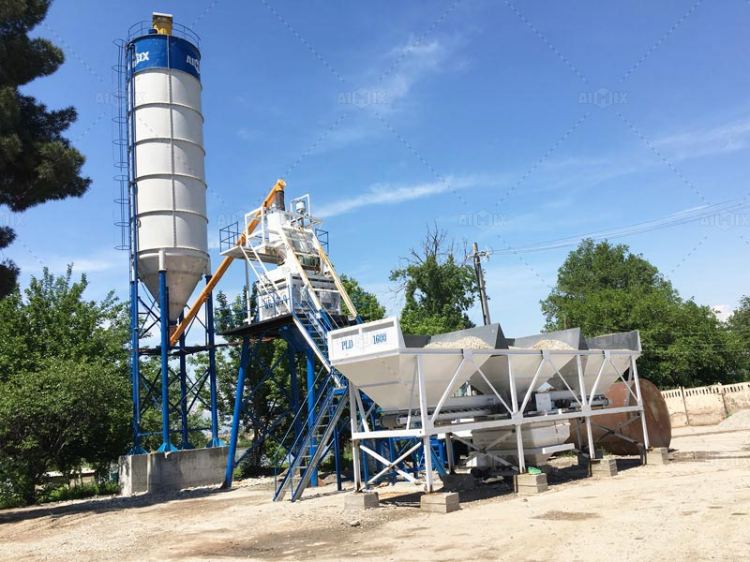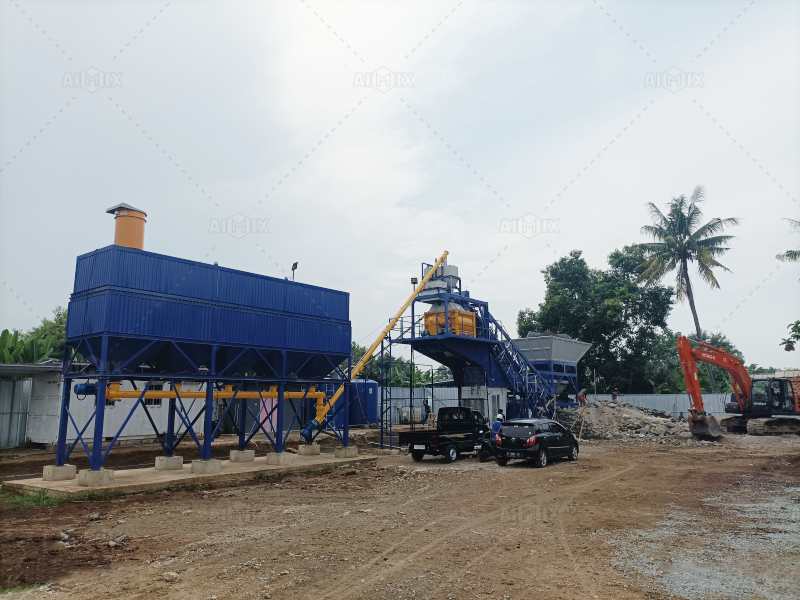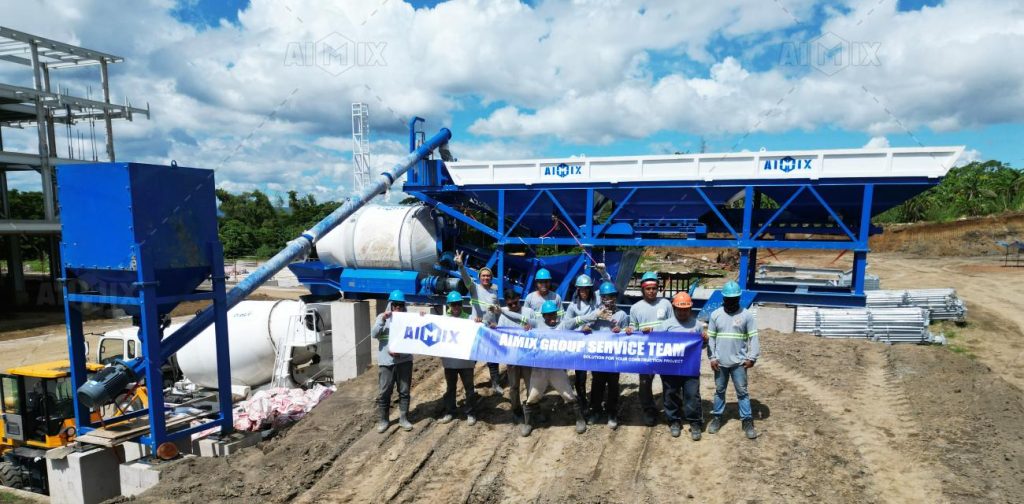In the fast-paced world of construction, having access to high-quality concrete is essential for ensuring the success of projects. For businesses that operate in smaller-scale or remote locations, purchasing a small concrete batch plant can significantly improve efficiency, reduce transportation costs, and provide consistent, high-quality concrete on-demand. This guide explores the key options, benefits, and considerations when buying a small concrete batch plant for sale, with a particular focus on portable concrete plants, mini batching plants, and reliable concrete batching plant suppliers.

What is a Small Concrete Batch Plant?
A small concrete batch plant is a compact, affordable solution for businesses that need to produce concrete in smaller quantities or on smaller construction sites. These plants typically have a lower production capacity compared to large, stationary concrete batching plants but offer significant advantages in terms of mobility, ease of use, and cost. Small concrete batch plants are ideal for projects such as residential buildings, small commercial developments, roads, and even DIY concrete work.
Types of Small Concrete Batch Plants
There are several types of small concrete batch plants available for sale, each designed to meet different needs. The most common options include:
1. Portable Concrete Plants
Portable concrete plants are designed for easy transportation and setup at various job sites. These plants are mounted on trailers or chassis, making them simple to move from one location to another. Portable plants are often equipped with all the necessary components, such as cement silos, aggregate storage bins, and mixers, making them a complete solution for producing concrete on-demand.
The key advantage of portable concrete plants is their flexibility. If your business operates in multiple locations or on temporary job sites, a portable plant allows you to set up production quickly without needing to invest in permanent infrastructure. Additionally, portable concrete plants are often more affordable than larger stationary plants, making them an excellent choice for businesses with limited budgets.
2. Mini Batching Plants
Mini batching plants are small-scale concrete mixing plants that typically have a capacity of 20 to 50 cubic meters per hour. These plants are designed for businesses that need to produce small to medium quantities of concrete efficiently. Like portable plants, mini batching plants are compact, easy to transport, and require minimal space for operation. They often come with automated control systems for easy operation and precise batching, ensuring consistent concrete quality.
Mini batching plants are ideal for smaller construction projects, such as residential buildings, small commercial developments, or even municipal work like sidewalks and parks. They are an excellent choice for contractors who want the flexibility to move the plant between different sites while maintaining high levels of productivity.
3. Stationary Small Concrete Batch Plants
Although stationary small concrete batch plants are not as portable as their mini or portable counterparts, they are still compact and suitable for smaller-scale production needs. These plants are typically installed in one location and provide high efficiency and consistent performance. Stationary plants are an ideal choice for businesses that have a fixed job site or need a consistent concrete supply over a long period.

Benefits of Small Concrete Batch Plants
Purchasing a small concrete batch plant offers a variety of benefits that can improve your business’s operations and reduce costs.
1. Reduced Transportation Costs
One of the most significant advantages of owning a small concrete batch plant is the reduction in transportation costs. Typically, businesses must buy ready-mixed concrete from a supplier, which involves expensive delivery fees and the risk of delays or inconsistencies in the concrete’s quality. By producing concrete on-site, you eliminate transportation expenses and ensure that your concrete is fresh and meets the exact specifications of your project.
2. Improved Quality Control
When you produce your own concrete using a small batch plant, you have complete control over the mix and can adjust the proportions of materials as needed. This control ensures that the concrete meets the necessary standards for your project, reducing the likelihood of defects or issues during construction.
3. Flexibility and Mobility
For businesses operating on multiple job sites or in remote locations, a portable or mini batching plant offers unparalleled flexibility. These plants are easy to move from one site to another, allowing you to meet the specific needs of each project. Whether you’re working on a residential building in one location or a road project in another, having a portable concrete plant means you’re always ready to supply concrete when and where you need it.
4. Increased Productivity
With a small concrete batch plant on-site, you can produce concrete as needed, eliminating the delays associated with waiting for deliveries. This continuous supply of concrete ensures that work on your project can proceed without interruption, increasing overall productivity and keeping projects on schedule.
5. Cost-Effective for Smaller Projects
For small businesses or contractors, investing in a small concrete batch plant can be far more cost-effective than relying on ready-mix concrete suppliers. The upfront cost of purchasing a mini or portable batching plant is relatively low compared to larger, stationary plants, and the savings in transportation and delivery costs can quickly add up.

Factors to Consider When Buying a Small Concrete Batch Plant
When purchasing a small concrete batch plant for sale, it’s essential to consider several factors to ensure that you choose the right model for your needs.
1. Production Capacity
Consider the amount of concrete you need to produce per hour. Small concrete batch plants typically have production capacities ranging from 20 to 60 cubic meters per hour. Choose a plant that can meet your production needs without over-investing in capacity that you won’t fully utilize.
2. Mobility Requirements
If your business operates on multiple job sites, a portable or mini batching plant may be the best choice. These plants are designed for easy transport and quick setup, so you can move them as needed.
3. Automation and Control Systems
Many modern small concrete batch plants come with automated control systems that ensure accurate batching, mixing, and delivery. These systems make it easier to manage production and ensure that your concrete is mixed to the correct specifications every time.
4. Brand and Supplier Reputation
Choose a reliable concrete batching plant supplier with a good track record of customer support, warranty services, and product quality. Brands such as Aimix, Aicrane, and ELKON are known for their high-quality small concrete batch plants and have established themselves as trustworthy suppliers in the market.
Choosing the Right Concrete Batching Plant Supplier
When looking for small concrete batch plants for sale, it’s crucial to partner with a reputable supplier. Leading concrete batching plant suppliers offer a wide range of options, including portable concrete plants and mini batching plants, as well as comprehensive after-sales support. A good supplier will help you select the right plant based on your project’s requirements, provide installation services, and offer maintenance and spare parts.
Conclusion
Investing in a small concrete batch plant can be a game-changer for your construction business. Whether you choose a portable concrete plant, a mini batching plant, or a stationary option, having access to on-site concrete production allows for greater flexibility, improved quality control, and cost savings. Be sure to evaluate your production needs, mobility requirements, and supplier reputation when selecting the right plant for your business. With the right equipment and supplier, you can ensure consistent concrete quality and increased productivity on your projects.